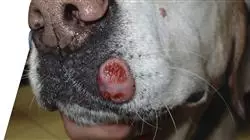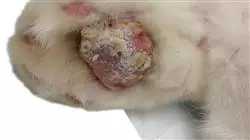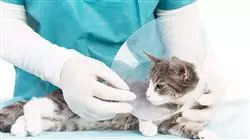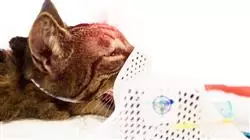University certificate
The world's largest faculty of veterinary medicine”
Description
Become one of the most demanded professionals today: specialize in Clinical Oncology in Small Animals with this comprehensive online program"

The postgraduate diploma in Clinical Oncology in Small Animals provides up-to-date, relevant and practical knowledge on various oncological diseases that affect pets. It takes detailed, multidisciplinary look into the approach, management and latest techniques in the field of veterinary oncology.
Small Animal Oncology is a subspecialty of Internal Medicine which has experienced great development in the last decades. The professors on this specialization program are at the forefront of the latest diagnostic techniques and treatments of oncological diseases in small animals. Due to their specialized training, they have designed a useful, practical program adapted to the current situation, an increasingly demanding and specialized reality.
All the professors on the program are clinicians and/or university professors with experience in both undergraduate and postgraduate training. The participating professors are specialized in different areas involved in Small Animal Oncology such as clinical oncologists, oncological surgeons, radiologists and anatomopathologists. The aim is to offer a program that takes a multidisciplinary approach to oncology.
This program specializes general practitioners in veterinary oncology in an area that is increasingly in demand, partly due to its prevalence, and partly to the specialization the area requires and demands.
All the modules compiled include the author's experience, without forgetting scientific rigor and the most important evidence-based updates. It addresses diseases and action protocols, and it considers integral approach to patients, including disease, patient and owner.
The program also includes a large amount of multimedia material: photos, videos, diagrams, imaging techniques and surgery.
As it is an online Postgraduate Certificate course, students are not restricted by set timetables, nor do they need to physically move to another location. All of the content can be accessed at any time of the day, so you can balance your working or personal life with your academic life.
Take the opportunity to learn about the latest advances in this area to apply them to your daily practice"
This postgraduate diploma in Clinical Oncology in Small Animals contains the most complete and up-to-date scientific program on the market. The most important features include:
- The latest technology in online teaching software
- A highly visual teaching system, supported by graphic and schematic contents that are easy to assimilate and understand
- Practical cases presented by practising experts
- State-of-the-art interactive video systems
- Teaching supported by telepractice
- Continuous updating and recycling systems
- Autonomous learning: full compatibility with other occupations
- Practical exercises for self-evaluation and learning verification
- Support groups and educational synergies: questions to the expert, debate and knowledge forums
- Communication with the teacher and individual reflection work
- Content that is accessible from any fixed or portable device with an Internet connection
- Complementary documentation databases that are permanently available, even after the program
You will benefit from the experience of expert professionals who will contribute their experience in the field to the program, making it a unique opportunity for professional growth"
Our teaching staff is made up of professionals from different fields related to this specialty. That way, TECH ensures to offer the updating objective it intends to provide. A multidisciplinary team of professionals specialized and experienced in different environments, who will develop the theoretical knowledge efficiently, but, above all, will put at the service of the program the practical knowledge derived from their own experience: one of the differential qualities of this specialization.
This mastery of the subject is complemented by the effectiveness of the methodology used in the design of this postgraduate diploma in Clinical Oncology in Small Animals. Developed by a multidisciplinary team of e-Learning experts, it integrates the latest advances in educational technology. That way, students will study with a range of easy-to-use and versatile multimedia tools that will give them the necessary skills needed during training
The design of this program is based on Problem-Based Learning: an approach that views learning as a highly practical process. To achieve this remotely, TECH will use telepractice: with the help of an innovative interactive video system and Learning from an Expert, the student will be able to acquire the knowledge as if they were facing the scenario they are learning at that moment. A concept that will allow you to integrate and fix learning in a more realistic and permanent way.
Our innovative telepractice concept will give you the opportunity to learn through an immersive experience, which will provide you with a faster integration and a much more realistic view of the contents: Learning from an expert"

Objectives
The objective is to enable highly qualified professionals for work experience. An objective that is complemented, moreover, in a global manner, by promoting human development that lays the foundations for a better society. This objective is focused on helping medical professionals reach a much higher level of expertise and control. A goal that our students can achieve in only a few months of a highly intensive and accurate program.

If your goal is to turn your skills towards new paths of success and development, this is the postgraduate diploma for you: A program that aspires to excellence"
General Objectives
- Examine the basis of tumor biology and etiology of cancer
- Analyze the different types of epidemiologic studies used in cancer research
- Generate protocols for a general approach to cancer patients
- Perform cytological technique and interpretation
- Propose a system for biological specimen referral to anatomic pathology laboratories and analyze the information provided in anatomopathological reports
- Examine various modalities in the imaging techniques used to diagnose cancer in patients
- Present the molecular diagnostic techniques available in oncology
- Evaluate the therapeutic modalities of cancer treatment such as surgery and chemotherapy
- Define new treatment options for cancer patients such as electrochemotherapy and molecular/targeted therapy
- Evaluate therapeutic modalities in new-onset and/or less accessible cancers
- Define para-neoplastic syndromes and associated complications
- Analyze key aspects of informing owners about small animal cancers
- Specify palliative care in cancer patients
Specific Objectives
Module 1. Introduction to Oncology. Etiology, Biology and Epidemiology of Cancer. Anatomopathological Diagnosis
- Analyze the genetic basis of cancer, as well as the influence of chemical, physical, hormonal and viral factors in its development
- Define tumor biology and metastases formation
- Compile the different types of epidemiologic research used in the study of cancer
- Define the concept of translational medicine and its implication in human cancer research
- Propose protocols for the diagnostic and therapeutic approach in cancer patients
- Develop the cytologic technique and interpretation in depth
- Identify the key points to correctly refer biological samples to anatomic pathology laboratories
- Establish the guidelines to correctly interpret anatomic pathology reports
Module 2. Cancer Diagnosis. Imaging and Molecular Diagnostic Techniques. Chemotherapy, Electrochemotherapy and Molecular/Targeted Therapy
- Develop radiology as an imaging technique in cancer patient staging
- Analyze ultrasound as an imaging technique in the diagnosis of cancer patients
- Evaluate computed tomography and magnetic resonance imaging as advanced imaging techniques in the diagnosis of oncologic patients
- Specify the advantages and limitations of diagnostic imaging techniques to define their scope of application
- Evaluate surgery as one of the first cancer treatment modalities
- Define the concepts of surgical margins and types of surgery in oncology, as well as the advantages and limitations of this therapeutic modality in cancer treatment
- Develop new therapeutic modalities in the treatment of oncology patients such as electrochemotherapy and molecular/targeted therapy
- Establish the side effects, advantages and limitations of chemotherapy, electrochemotherapy and molecular/targeted therapy in the treatment of oncology patients
Module 3. Cancer Patient Treatment: Radiotherapy, Immunotherapy, and Interventional Oncology. Complications in Oncological Therapy. Palliative Care
- Analyze the indications, advantages, limitations, and side effects of radiation therapy as an oncological treatment modality in small animals
- Examine the indications, advantages, limitations, and side effects of immunotherapy as a small animal oncology treatment modality
- Evaluate the indications, advantages, limitations, and side effects of interventional oncology as a small animal oncology treatment modality
- Define paraneoplastic syndromes in dogs and cats
- Propose action protocols for oncological emergencies
- Establish guidelines to establish a proper line of communication with cancer patient owners
- Analyze the treatment of pain in oncological patients
- Develop nutritional support plans for cancer patients

Postgraduate Diploma in Clinical Oncology in Small Animals.
Small animal clinical ontology is the systematic and structured study of veterinary medical terminology used in the diagnosis, treatment and follow-up of different diseases in small animals. It is a field of veterinary medicine that focuses on classifying and organizing medical information into precise and coherent categories to support clinical decision making at regional, national and international levels.
The small animal clinical ontology has as its main objective to facilitate the exchange, interoperability and integration of medical data between different veterinary clinics, animal medicine professionals, academic organizations and information technology companies. To achieve this, formal logic, expert knowledge and advances in information technology are applied to develop accurate and accessible clinical ontologies.
Small animal clinical ontology is useful for veterinary professionals in the clinical assessment of different diseases, management of electronic medical records with standardized formats, consistent reporting, and improving safety in medical care by preventing recording errors, duplication, or inconsistencies in data. Small animal clinical ontology is under continuous development and adoption, and is expected to continue to expand in the future, improving small animal health and medical care. Research and academic training are critical to continue to advance the field.
TECH the world's largest digital university has a specialized academic program designed to provide students with solid skills in clinical ontology and specialized knowledge in the diagnosis and treatment of diseases in animals. Students will learn to apply current diagnostic and treatment techniques and work in multidisciplinary teams to provide a comprehensive approach to patient care.







